How to Accept Yourself: 6 Steps to Self-Acceptance

Do you ever wish that you could stop comparing yourself to others and like yourself a bit more, especially when you make a mistake?
Is there a difference between how you feel about yourself when you succeed and when you don’t?
While many people believe that becoming better versions of themselves means working on their strengths and learning new skills, the true road to happiness is self-acceptance – loving all parts of yourself as they are now.
What is self-acceptance?
Unlike self-esteem, which is either positive or negative and might fluctuate depending on one’s accomplishments, unconditional self-acceptance is the ability to love yourself despite your shortcomings.
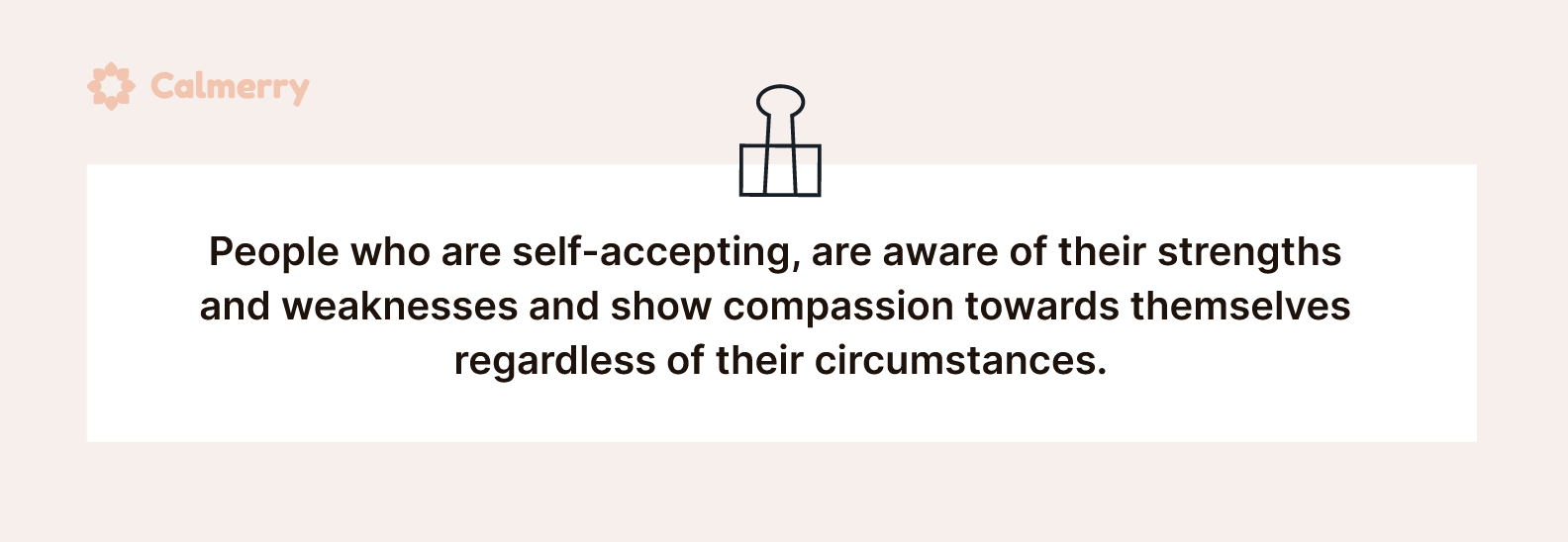
They understand that just because they might have lost a job or just because their relationship has ended doesn’t mean that they’re a failure. And don’t let such events determine their value.
If someone has ever made you feel like you aren’t good enough, you might now find it difficult to accept yourself and even wish that you were a completely different person.
How to accept yourself unconditionally in 6 steps
Accepting who you are is a gradual process that takes a lot of work. But it’s worth the effort as it has various psychological benefits.
Once you accept yourself, you’ll notice that you exhibit higher resilience and aren’t afraid of taking risks because you know that whatever happens, it will make you stronger and more self-aware.
Additionally, you don’t need to worry about gaining people’s approval, which gives you more freedom to go after what you want in life. When you live true to yourself, that’s when you can feel happy and fulfilled.
Here’s how you can practice self-acceptance:
1. Stop comparing yourself to others
On the one hand, social media can be a great tool to help you improve your body image – for every flaw you see in yourself, there’s an Instagram account that celebrates it. On the other hand, having access to people’s seemingly perfect lives might make it impossible not to fall victim to comparison.
We all compare ourselves to others once in a while. But if you struggle with self-acceptance, you might be particularly vulnerable to the negative influence it might have on your well-being.
It’s easier said than done, but if you want to fully embrace who you are, you have to learn how not to focus on other people. Their successes or failures shouldn’t affect the way you feel about yourself because you’re your own person with unique strengths and weaknesses.
While limiting social media use might not be enough to stop social comparison altogether, it can give you fewer opportunities to do so. Unfollow accounts that don’t serve your mental health, and follow those that inspire you to cultivate self-love.
Another great method that can help you stop comparing yourself to others is keeping a gratitude diary, where you list everything you’re grateful for in your life.
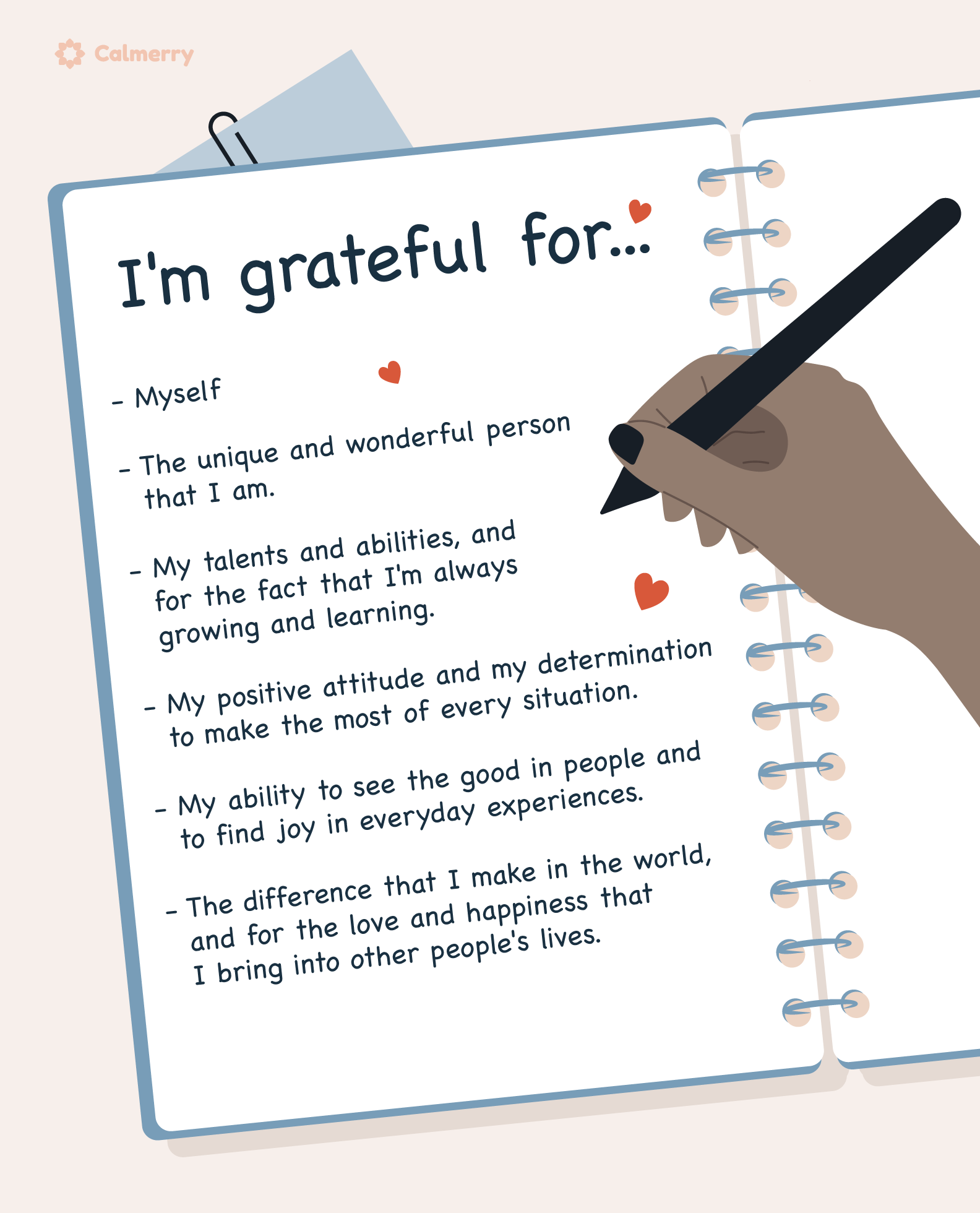
Redirecting attention to positives can encourage you to appreciate the present moment for what it is, as well as your personal attributes.
If you feel like keeping a diary is just another thing you have to add to your to-do list, you can always try the Positive Emotion Refocusing Technique, which doesn’t require writing anything down:
- Take a few deep breaths
- Then focus on something you’re grateful for, such as the presence of friends in your life
- Try to connect with that loving part of yourself as much as possible
- And then ask it how you can overcome the present difficulty
This exercise should ground you in the present and help you work through difficult emotions that might be preventing you from achieving self-acceptance.
For example, it’s okay to feel disappointed because you haven’t passed your exam. But if it makes you feel unworthy and contributes to a negative self-image, you should try to work towards gradually unpacking these emotions.
Low self-esteem makes you look at the world in a negative light. And keeping a self-esteem journal is a great way to begin thinking about the good things you do and experience, setting yourself up for a positive outlook on life.
Don’t know what to write about? Download this free worksheet with 3 journaling prompts for each day of the week 👉🏾 Self-Esteem Journal
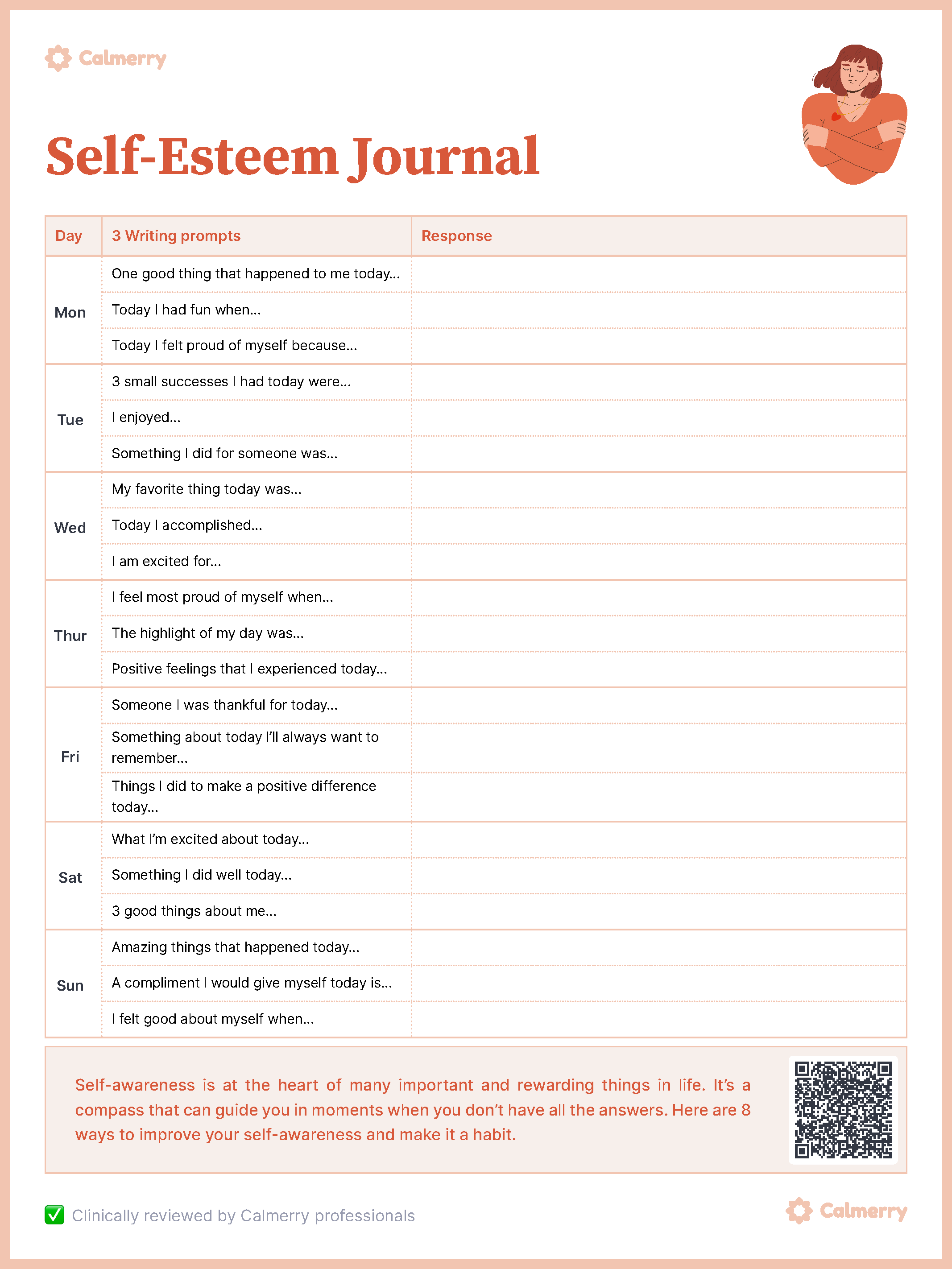
2. Practise positive self-talk
People who struggle with self-acceptance tend to focus on their flaws instead of seeing themselves as human beings that are imperfect but not faulty.
What’s more, some suffer from the ‘impostor syndrome’, which means that they might doubt their abilities and downplay their successes even when they’re doing just fine. While the syndrome is often a result of having been brought up by parents who constantly switch from praise to criticism, more and more people struggle with feeling inadequate due to society’s pressure to achieve and improve all the time.
Even though there’s recently been more urgency to prioritize mental health, the hustle culture that celebrates constant productivity is alive and well.
Luckily, the effects of this kind of negative conditioning can often be reversed with positive self-talk.
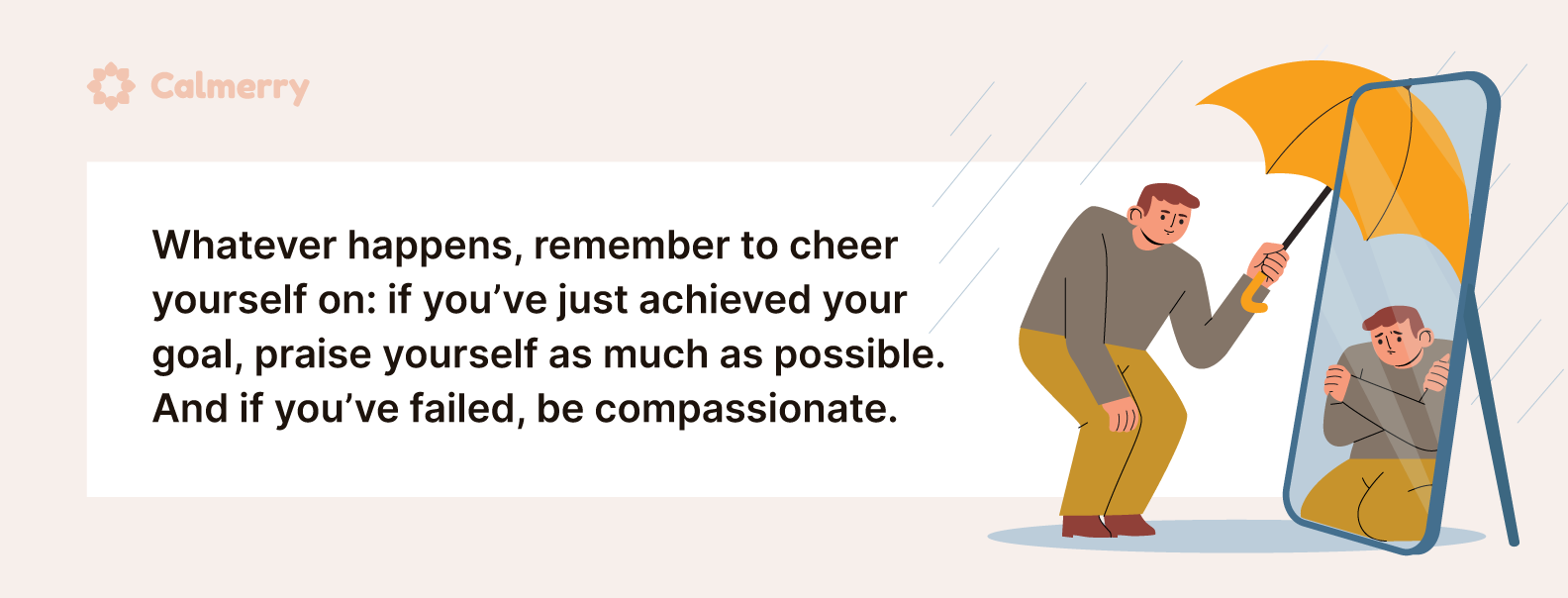
Tell yourself that you’ve done your best, but things don’t always work out the way you’d like them to. According to the research, the more you practice self-compassion, the more accepting of your flaws you will become.
A good daily practice is also choosing a few positive affirmations and repeating them in front of the mirror. Affirmations are statements about yourself that can help you overcome negative self-talk, which contributes to your lack of self-acceptance.
Good examples of an affirmation are ‘I’m worthy’ or ‘I’ll cope with whatever happens’. Reframing your thinking not only boosts your mood and gives you more confidence, but studies show that it can also lower stress, which makes it less likely self-deprecating thoughts will arise in the first place.
3. Let go of perfection
Think about famous people with disabilities. They probably felt inadequate at some points in their lives, but they’re now doing something they’re passionate about, and their success could be in large part due to what sets them apart from other people.
For example, Peter Dinklage, who has a type of dwarfism, struggled with self-acceptance but is now a widely-recognized and beloved actor.
Even though not everyone has a disability, everyone can find something that they dislike about themselves and see it as a trait that makes them unique. A huge part of the self-acceptance journey is learning how to view yourself as a whole person and cultivate self-love based on both good and bad qualities.
If you don’t know where to start, write down things you like and dislike about yourself and divide them into those that can and can’t be changed.
It’s the second category you want to focus on. Choose one thing you wish you could change and remind yourself that it’s what makes you you.

Stop telling yourself that you must be perfect – the more you worry about failing, the less likely you are to take risks and live the life you want. Instead, embrace making mistakes and see them as an experience you can learn from.
Even if you’ve recently failed at something and struggle with self-blame, try to find the good in the bad. Consider what you might have learned from it and how you can approach the situation differently next time.
Nobody’s perfect, and having zero flaws is impossible. But having greater self-awareness can help you grow as a person.
4. Increase self-awareness
Have you ever wondered why some people keep undergoing plastic surgeries even though the results seem to be less favorable each time?
It’s possible that their subconscious mind is programmed to view them as ugly, and no amount of changes will ever make them feel good about themselves.
If you struggle with self-acceptance, you might hold negative beliefs about yourself that you aren’t always aware of. These beliefs are a result of painful past experiences.
For example, you might have been rejected by a group of peers and called boring. As a result, you might feel insecure in social situations and always focus on the negatives to further reinforce this belief, even despite having a lot of friends.
To increase your self-awareness, try keeping a journal, where you can talk about your thoughts and emotions.
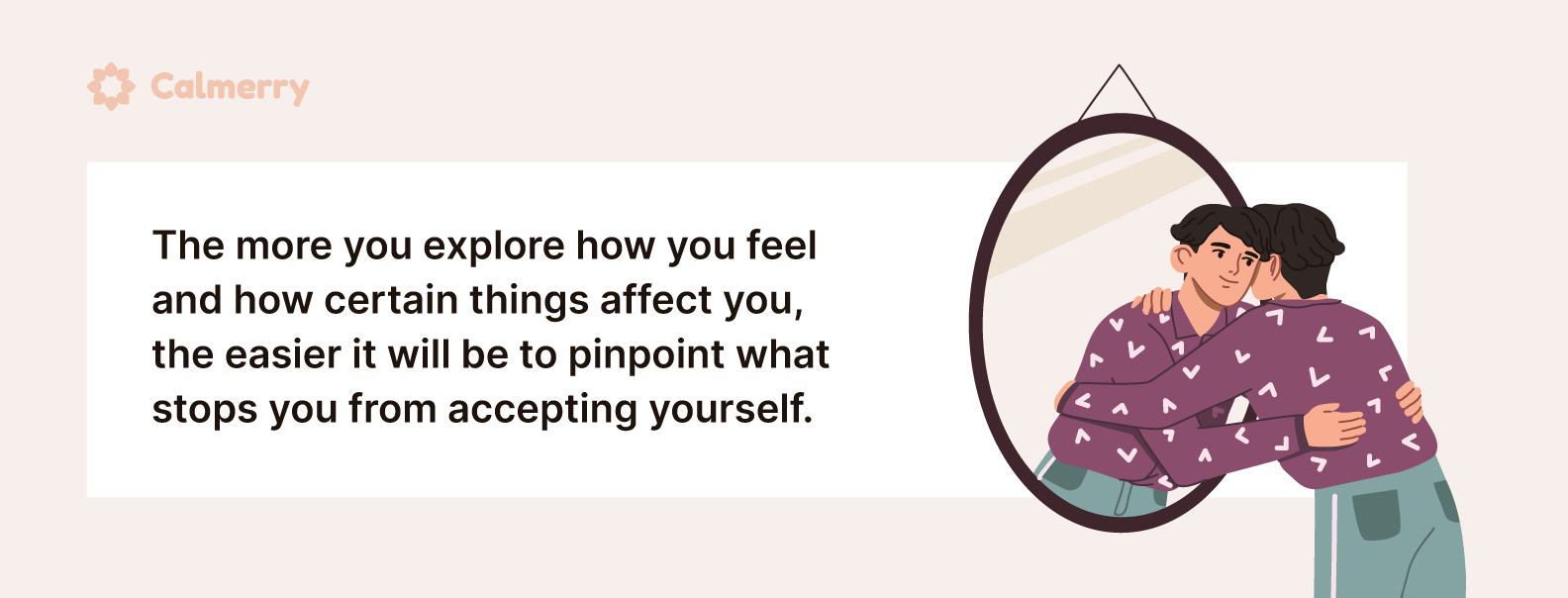
5. Create a strong support network
Friends are more important than you think. Several studies have documented the positive influence a strong support network has on one’s mental well-being, such as lower stress levels and higher resilience. The less stressed you are, the better you can cope with life’s adversities.
And resilience also plays an important role in self-acceptance. The study on ‘Self-acceptance, resilience, coping and satisfaction of life in people who stutter’ examined people who stutter and their quality of living, found that resilience served as a protective factor that translated into higher life satisfaction and being more self-accepting.
To create a strong support network, try to make some time for meaningful social connections every month. But remember that quality matters more than quantity. The key is surrounding yourself with people who truly like you for who you are.
6. Consider therapy
If you’ve grown up surrounded by judgment, it’s only natural that you struggle with self-acceptance. While for some people changing their environment and making friends who like them unconditionally is a big enough step in the right direction, some need an extra push.
Cognitive behavioral therapy is the treatment of choice when it comes to learning how to love yourself. It teaches you how to recognize harmful thinking patterns and helps you develop new beliefs about yourself.
If the idea of opening up in front of a stranger in an unfamiliar environment fills you with dread, remember that CBT can be done with the help of an online therapist at Calmerry from the comfort of your home.
Learning to accept yourself isn’t easy, but it’s never too late to give it a go.
online therapy
live video session



